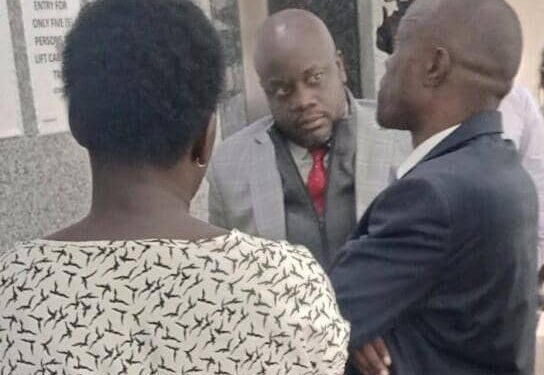BY URN
The High court has dismissed an application filed by David Livingstone Ebiru, the former executive director of Uganda National Bureau of Standards (UNBS) seeking to halt his bribery trial charges until investigations by the Inspectorate of Government are completed.
Today anti-corruption division judge Jane Okuo Kajuga ruled against the application filed against the Attorney General, stating that it was incorrectly filed before court due to a lack of territorial and material jurisdiction to enforce Ebiru’s human rights.
Ebiru is facing charges of offering a Shs 100 million bribe or gratification to Charles Masekuura, the UNBS board chairperson between October and December 2022 to secure his position as the UNBS executive director. On August 8, 2023, the Chief Magistrate’s court, presided over by Joan Aciro, issued a warrant of arrest against Ebiru, directing the police to apprehend him immediately upon sight.
However, all attempts to arrest him have been unsuccessful, instead he filed case against the Attorney General challenging the criminal trial. In his application, represented by his lawyers from Web Advocates, Ebiru contended that he was aggrieved by the Inspectorate of Government’s (IG) decision to prematurely sanction charges against him without conducting prior investigations. He sought to halt the trial, arguing that his fundamental rights and freedoms were violated by the IG’s actions in issuing a warrant of arrest and preferring charges.
Ebiru also claimed that there was a pending warrant of arrest in the Anti-Corruption court, and there was an imminent threat of its enforcement, rendering his application useless. As part of his case, he requested that the court declare the criminal summons, warrant of arrest, and trial illegal. He also sought a permanent injunction against the Inspector General of Government-IGG and her agents from instituting charges against him, as well as an order for compensation against the government for violating his fundamental rights.
However, the Attorney General, through principal state attorney Wanyama Kodoli, urged the court to dismiss the application for a temporary injunction. The Attorney General argued that the Anti-corruption court division (ACD) had no jurisdiction to hear human rights enforcement matters, which should have been filed elsewhere. Wanyama explained that the ACD was established as a specialized division with the sole authority to handle corruption-related cases.
Therefore, the nature of Ebiru’s application, which was a civil matter, should not have been filed in the ACD. In response, Ebiru’s lawyer argued that the Human Rights Enforcement Act grants the High court and Magistrate’s court, which handle criminal matters, the authority to examine human rights violations arising from their courts. He added that the court where these matters are raised may rely on civil law or procedure to issue an injunction halting the proceedings.
In her ruling delivered on Wednesday, Kajuga agreed with the Attorney General’s submissions and dismissed the application for lack of jurisdiction. She explained that the case before her was arising from a criminal matter still pending in the Chief Magistrate’s court, where Ebiru had not yet appeared and was on a warrant of arrest.
Justice Kajuga emphasized that issues related to human rights violations should have been raised before the Chief Magistrate’s court because, in corruption-related matters, the High court can only intervene when a matter had been referred to it by the lower court and was already before it.
She further clarified that the High court could not intervene in a matter filed directly before it, diverting from the original legal procedure, as the case against Ebiru had not been committed to the High court for trial—a step that could only be taken by the Magistrate’s court, which had not occurred yet.
As such, Kajuga dismissed the application for a temporary injunction, as well as the main suit based on the Attorney General’s preliminary objection. Following the ruling, Ebiru’s lawyer, Silas Kahima Mugabi, stated that he would consult with his client to determine the next steps.
These could include considering an appeal, appearing to be charged, or raising the same human rights violations before the Magistrate’s court. It’s worth noting that while it has been alleged that Ebiru admitted to bribing the UNBS board with Shs 100 million to avoid suspension—a sum he allegedly borrowed—he has consistently maintained that these statements were made out of anger and that he had never actually bribed anyone.
Do you want to share a story, comment or opinion regarding this story or others, Email us on info@newsday.co.ug or ,Tel/WhatsApp........0702451828



